
ACTA OECOLOGICA-INTERNATIONAL JOURNAL OF ECOLOGY
Scope & Guideline
Empowering Conservation through Innovative Studies
Introduction
Aims and Scopes
- Ecological Interactions and Biodiversity:
The journal explores various ecological interactions among species, including competition, predation, and mutualism, to understand how these relationships influence biodiversity and ecosystem functioning. - Impact of Anthropogenic Factors:
Research frequently examines how human activities, such as urbanization, land-use change, and climate change, affect ecological dynamics, species distributions, and community structures. - Functional Ecology and Ecosystem Services:
The journal emphasizes studies that link functional traits of organisms to ecosystem services, highlighting how species contribute to ecological processes and the provision of benefits to humans. - Conservation and Restoration Ecology:
A significant area of focus is on conservation strategies and ecological restoration efforts, particularly in response to habitat loss and degradation, to preserve biodiversity. - Methodological Innovations in Ecology:
The journal encourages the use of diverse methodologies, including field experiments, modeling, and meta-analyses, providing a platform for novel approaches to address ecological questions.
Trending and Emerging
- Climate Change Effects on Ecosystems:
There is a marked increase in studies investigating the impacts of climate change on various ecosystems, focusing on species distributions, community dynamics, and ecosystem functioning. - Urban Ecology and Green Spaces:
Research related to urban ecology, including the effects of urbanization on biodiversity and the role of green spaces in cities, has gained prominence, reflecting growing concerns about urban sustainability. - Functional Traits and Ecosystem Responses:
An emerging interest in understanding how functional traits of species influence ecosystem responses to environmental changes is evident, with studies linking traits to ecological outcomes. - Interdisciplinary Approaches to Ecology:
There is a trend towards integrating ecological research with other disciplines, such as economics and social sciences, to address complex environmental issues, emphasizing the need for holistic solutions. - Microbial Ecology and Soil Health:
Increasing attention is being given to microbial interactions within ecosystems, particularly how soil health and microbial communities affect plant productivity and ecosystem resilience.
Declining or Waning
- Traditional Species Inventory Studies:
There appears to be a decrease in papers solely focused on species inventory and descriptive studies, which have been increasingly supplanted by research emphasizing ecological interactions and processes. - Invasive Species Management Strategies:
Although still relevant, the specific focus on management strategies for invasive species seems to be declining, possibly overshadowed by broader ecological impacts of anthropogenic change. - Static Habitat Assessments:
Research concentrating on static assessments of habitats without considering dynamic ecological processes is becoming less frequent, as there is a shift towards understanding temporal changes and resilience. - Local Scale Studies:
There is a noticeable reduction in studies focusing exclusively on local-scale ecological processes, as researchers increasingly adopt landscape and global perspectives to address ecological questions.
Similar Journals
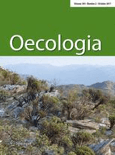
OECOLOGIA
Bridging Disciplines to Illuminate Nature's ComplexitiesOECOLOGIA is a prestigious journal dedicated to the interdisciplinary fields of ecology, evolution, behavior, and systematics, published by Springer. Established in 1968, this journal has consistently contributed to the scientific community, maintaining a strong impact factor reflected in its Q1 ranking within its category for 2023, and an impressive 79th percentile among 721 journals in the Scopus rank for Agricultural and Biological Sciences. With a commitment to advancing ecological knowledge and fostering innovative research, OECOLOGIA serves as a vital platform for researchers, professionals, and students exploring complex ecological dynamics and evolutionary processes. Although it does not offer open access, the journal remains dedicated to high-quality, peer-reviewed publications that inspire and inform the next generation of ecological science. For those interested in the latest trends and significant findings in biology and ecology, OECOLOGIA is an essential resource that continues to shape the discourse and understanding in these critical fields.
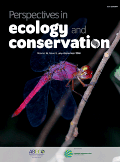
Perspectives in Ecology and Conservation
Bridging research and policy for effective environmental stewardship.Perspectives in Ecology and Conservation, published by Elsevier Science Ltd, is a leading academic journal dedicated to advancing the fields of ecology, conservation, and environmental management. With a Q1 ranking in multiple categories, including Ecology, Management, Monitoring, Policy and Law, and Nature and Landscape Conservation, this journal boasts an impressive standing among its peers, making it essential reading for researchers and professionals. Since its inception in 2017 and running through 2024, it aims to provide innovative perspectives and critical analyses that enhance our understanding and practices in conservation science. The journal is accessible through open access options, facilitating broader dissemination of knowledge. Its commitment to addressing contemporary ecological challenges reinforces its importance in the academic community, promoting sustainable practices and informed policy-making in the face of urgent environmental issues.

Journal of Fish and Wildlife Management
Bridging science and practice in fish and wildlife management.The Journal of Fish and Wildlife Management, published by the U.S. Fish & Wildlife Service, serves as a vital resource for scholars, researchers, and professionals in the fields of Animal Science, Ecology, and Conservation Biology. With its ISSN 1944-687X, this esteemed journal has been disseminating critical research findings since 2010, contributing significantly to the understanding of fish and wildlife conservation practices and their ecological impacts. Despite its Q3 category rankings in various disciplines as of 2023, it provides a platform for innovative research that influences policy and management strategies for biodiversity conservation. The journal, although not open access, remains committed to advancing the scientific discourse surrounding wildlife management with articles that emphasize practical conservation efforts and ecological sustainability. Readers can expect a diverse range of articles that promote best practices in the management and conservation of fish and wildlife resources, furthering our collective mission of preserving ecological health and biodiversity for future generations.
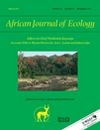
AFRICAN JOURNAL OF ECOLOGY
Exploring Africa's Ecological RichnessThe African Journal of Ecology, published by Wiley, is a leading academic journal in the field of Ecology, Evolution, Behavior, and Systematics. Established in 1963 and continuing its vital contributions to the field until 2024, this journal serves as a premier platform for researchers and scholars to share groundbreaking studies that explore the intricate relationships within ecosystems, particularly in the African context. With an impressive Scopus Rank of #423 out of 721 and a Q3 Quartile ranking, it stands as a credible source of scholarly information, gaining recognition among peers for its rigorous peer-review process and impactful publications. While the journal is not open access, it remains influential in driving advancements in ecological research and providing insights vital for conservation efforts and biodiversity studies. Authors and readers alike will find that the African Journal of Ecology not only promotes scientific inquiry but also fosters a deeper understanding of ecological dynamics that affect our world.
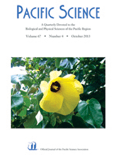
PACIFIC SCIENCE
Fostering Innovation Through Pacific ResearchPACIFIC SCIENCE is a prestigious multidisciplinary journal published by University of Hawaii Press, dedicated to advancing knowledge across diverse fields of study related to the Pacific region. With a robust ISSN of 0030-8870 and an E-ISSN of 1534-6188, this journal serves as a vital platform for researchers, professionals, and students to disseminate and access influential research findings that contribute to the understanding of ecological, cultural, and social dynamics in the Pacific. The journal has steadily maintained its relevance since its inception in 1947 and features a commendable Scopus Rank of #74 out of 171 in the multidisciplinarity category, placing it in the 57th percentile of its field, and is recognized as having a Q2 quartile ranking in 2023. Although lacking open access options, PACIFIC SCIENCE offers in-depth analysis and scholarly discourse, effectively bridging various disciplines to foster collaboration and innovation. With its commitment to high-quality research and its significant impact on Pacific studies, the journal continues to play an important role in informing policy, conservation efforts, and community engagement within this vital region.
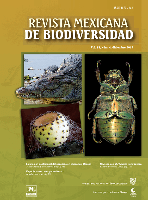
Revista Mexicana de Biodiversidad
Fostering Global Dialogue on Biodiversity and ConservationRevista Mexicana de Biodiversidad is a prominent academic journal dedicated to the field of biodiversity and conservation, published by the prestigious Instituto de Biología, Universidad Nacional Autónoma de México. Since its inception as an Open Access publication in 2005, it has aimed to disseminate high-quality research that advances the understanding of biological diversity in Mexico and beyond. With an ISSN of 1870-3453 and an E-ISSN of 2007-8706, the journal caters to a diverse audience, including researchers, professionals, and students, by providing vital insights into ecological studies, conservation strategies, and the sustainable management of natural resources. The journal is committed to fostering scientific collaboration and promoting the significance of biodiversity in addressing contemporary environmental challenges. By publishing innovative and impactful research, the Revista Mexicana de Biodiversidad plays an essential role in the global discourse on biodiversity conservation.

ECOLOGY LETTERS
Exploring the depths of ecological science for a sustainable tomorrow.ECOLOGY LETTERS, published by Wiley, is a premier journal dedicated to advancing the field of ecology and related disciplines. Renowned for its rigorous peer-review process and impactful research contributions, the journal boasts an impressive Scopus Rank of #13 out of 721 in the category of Agricultural and Biological Sciences, positioning it in the 98th percentile globally. With a Q1 rating in the 2023 quartile rankings for Ecology, Evolution, Behavior and Systematics, it serves as an essential platform for ecologists and evolutionary biologists to disseminate cutting-edge research findings from 1998 to 2024. Although not an open-access journal, ECOLOGY LETTERS actively contributes to the global ecology discourse, making it a critical resource for researchers, professionals, and students dedicated to understanding complex ecological interactions and evolutionary processes.
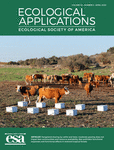
ECOLOGICAL APPLICATIONS
Connecting research to conservation for impactful change.ECOLOGICAL APPLICATIONS, published by WILEY, is a leading journal in the field of ecology, providing a platform for innovative research that addresses the understanding and management of ecological systems. With an ISSN of 1051-0761 and E-ISSN of 1939-5582, it has established itself as a vital resource for ecologists and environmental scientists since its inception in 1991. Ranked in the top quartile (Q1) for Ecology in 2023 and with a Scopus ranking of 40 out of 461 in Environmental Science, ECOLOGICAL APPLICATIONS boasts an impressive impact factor, attesting to its significance and influence in the field. The journal's mission is to publish peer-reviewed articles that contribute to ecological theory and its applications in conservation and environmental management. Researchers, professionals, and students alike will find invaluable insights and the latest developments in ecological research through its comprehensive scope and rigorous scholarship, ensuring a crucial role in shaping future ecological practices and policies.
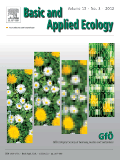
BASIC AND APPLIED ECOLOGY
Exploring the intricate connections of nature and science.BASIC AND APPLIED ECOLOGY, published by Elsevier GmbH in Germany, stands out as a premier journal in the field of ecology, evolution, behavior, and systematics. With its ISSN 1439-1791 and E-ISSN 1618-0089, the journal enjoys a distinguished reputation, evidenced by its classification in the Q1 category for Ecology in 2023 and impressively ranking #89 out of 721 in this domain according to Scopus. Since its inception in 2000, it has served as a vital platform for disseminating high-quality research that bridges theoretical insights and practical applications in ecology. Researchers, professionals, and students alike can look forward to the latest findings that not only foster a deeper understanding of ecological processes but also inform sustainable practices crucial for our environment. As the journal continues its journey through to 2024, it remains committed to advancing ecological knowledge and supporting innovative research in an ever-evolving field.
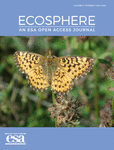
Ecosphere
Championing impactful research in environmental science.Ecosphere is a leading open-access journal published by WILEY, dedicated to advancing research in the fields of ecology, evolution, behavior, and systematics. Established in 2010 and headquartered in the United States, this innovative journal provides a platform for the exchange of cutting-edge scientific knowledge and discovery, fulfilling its mission to enhance our understanding of ecological systems and their interactions. With a prestigious impact factor reflecting its commitment to high-quality research, Ecosphere is ranked Q1 in both Ecology and Ecology, Evolution, Behavior, and Systematics for 2023, further solidifying its prominence in the scientific community. The journal's scope includes a wide array of topics related to environmental science, making it an essential resource for researchers, professionals, and students aiming to stay at the forefront of ecological research. It offers comprehensive open access options, ensuring that groundbreaking findings are readily available to a global audience, thus fostering collaboration and innovation in the field.